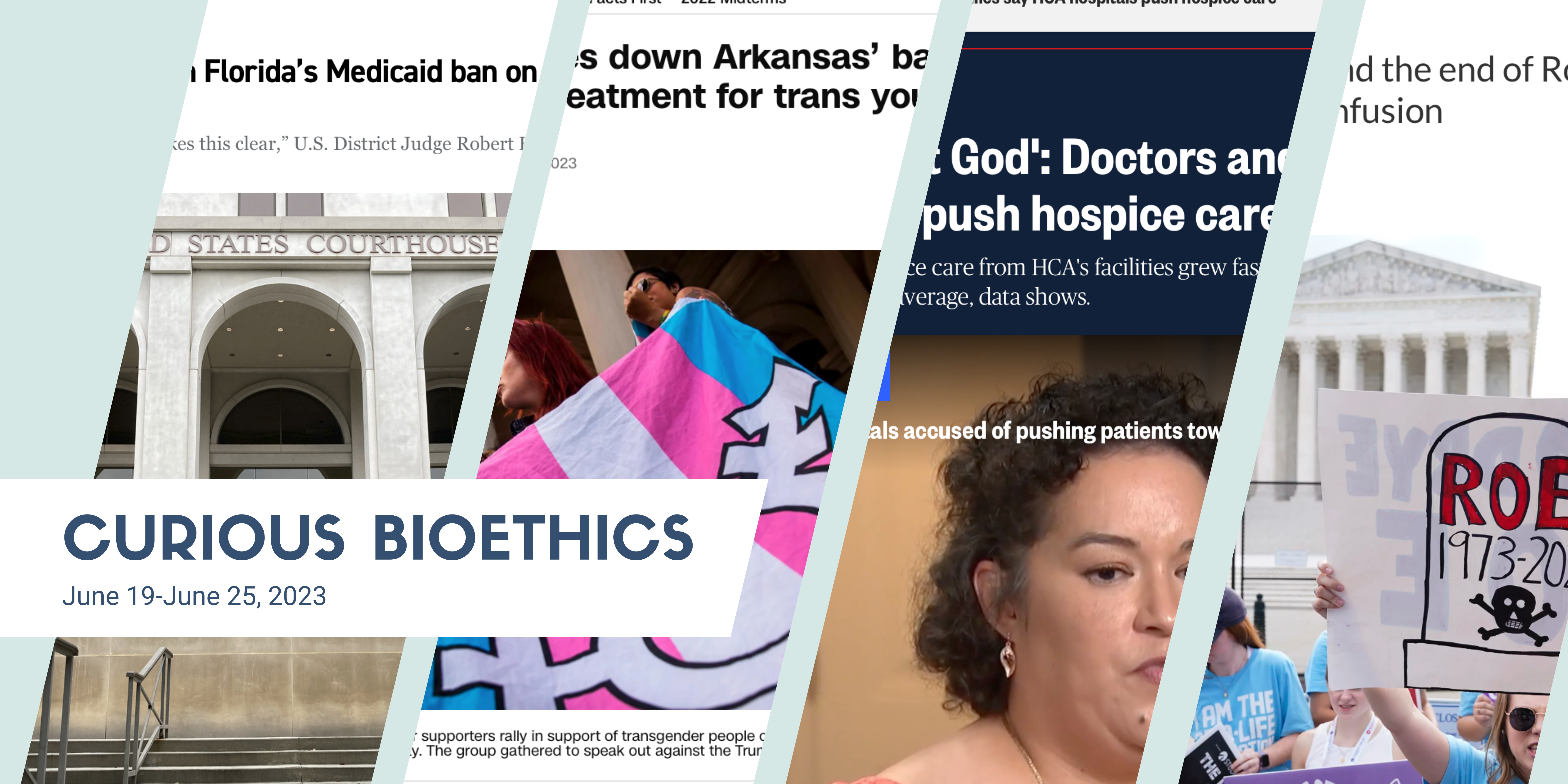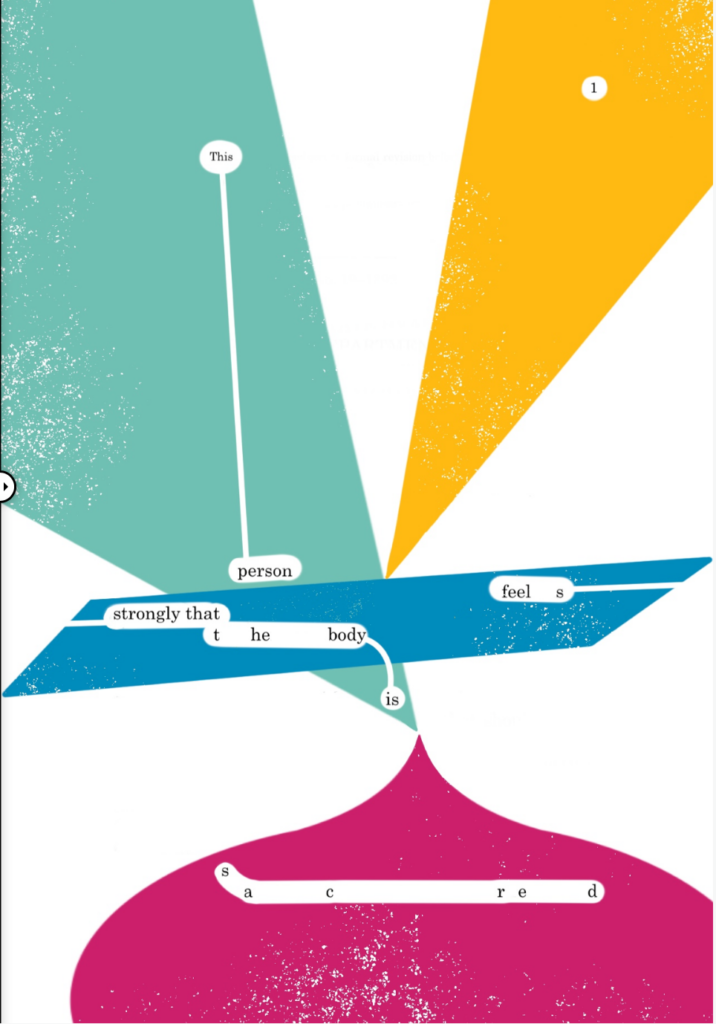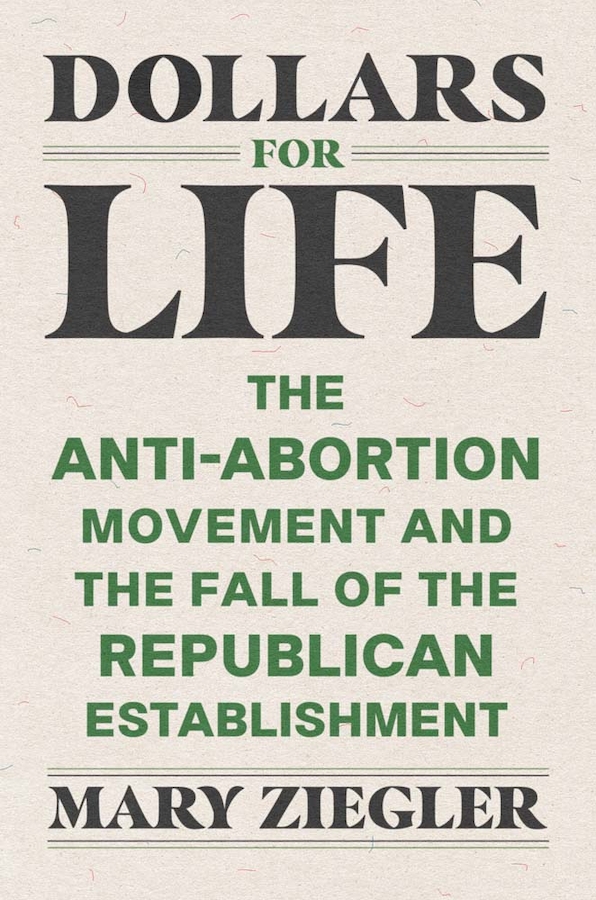
Each week, there is so much bioethics news, it can be hard to distill what happened each week. Each week, on Curious Bioethics, I’ll distill the major bioethics news stories that caught my attention, provide a few recommended readings options (opinions, long-form articles, books), and an educational opportunity (upcoming or past webinars with bioethicists or other top thinkers).
Also, if you missed these two great blog posts on Bioethics Today, check them out:
- It’s Never Too Early to Look Death in the Eye By Ilona Golynker
- Risking Death over Debt: The Moral Distress of EMTs Treating Patients Afraid of Medical Bills by G. M. Trujillo, Jr and Yedid Fernandez
In this week’s curated collection, you’ll find:
- Bioethics in the News: Dobbs’ 1st anniversary; Privacy records for Transgender patients in Tennessee given to AG; federal judges overturn anti-trans laws in three states; Pushing hospice
- Recommended Reading: Two Episodes at Sea, Dollars for Life
- Educational Opportunities: abortion data and the future of abortion activism, Ethics and AI conversation
Bioethics in the News
Dobbs’ One-Year Anniversary
“If 50 years ago the field of OB-GYN had not been so skittish about abortion and this care had been firmly entrenched in medical institutions, it is quite possible that abortion would have come to be understood — by the medical profession and the general public — primarily as health care and not as the most divisive issue in American politics.”
~Carole Joffe in STAT News
On the anniversary of losing a federal right to abortion, there is a lot of bad stuff to reflect on. Once turned over to states, Americans’ access to abortion quickly devolved into chaos and is compounding maternal morbidity and mortality. Carole Joffe, an Ob/Gyn at UCSF, writes poignantly that OB-GYNs missed a critical opportunity to solidify abortion as health care after Roe.

Jessica Valenti at Abortion, Every Dayis a critical abortion resource. In her essay “A Year of Abortion, Every Day,” she outlines the biggest stories of the last year related to the loss of abortion access for millions of Americans. For a great interview with Jessica, check out Boom! Lawyered.
Vanderbilt turns over transgender patient records to state in attorney general probe
Vanderbilt University Medical Center has turned over transgender patient medical records to the Tennessee Attorney General’s office, which confirmed Tuesday it is conducting an investigation into potential medical billing fraud… “billing for transgender care services provided to individuals enrolled in State-sponsored insurance plans.” The state requested medical records from Jan. 1, 2018 to the present.
The state claims the probe is solely related to potential billing fraud and not transgender care. In the current political climate, Tennessee patients are scared their records will be used inappropriately by the government to deny critical healthcare needs and further harass and marginalize them.
While we’re talking about trans issues in Tennessee:
- On Friday, June 23, the state also dismissed a request to overturn a 1977 law so that transgender patients to change the sex on their birth certificates. (On the same day, Kansas’ AG moved to ban changing sex on birth certificates)
- The U.S. Department of Justice complaint against Tennessee’s ban on gender-affirming care for minors is ongoing.
- Tennessee’s drag ban was found to be unconstitutional.
Federal Judges Struck Down Anti-Transgender Laws in Three States
“Gender identity is real. The record makes this clear.”
~Judge Hinkle re: Florida Medicaid case
Indiana’s ban on gender-affirming care for minors will not take effect on July 1, thanks to a preliminary injunction. The ban on gender-affirming surgeries will remain in effect. Indiana doctors will be allowed to communicate with out-of-state doctors about gender-affirming care for their minor patients.
Judge James M. Moody Jr. wrote in an 80-page ruling that Arkansas’ 2021 “Save Adolescents from Experimentation Act” violated the US Constitution and that state officials cannot enforce the law.
U.S. District Judge Robert Hinkle overturned Florida’s ban on Medicaid coverage for gender-affirming care.
HCA Hospitals Accused of Pushing Hospice
Now, new criticisms are arising related to HCA’s palliative and end-of-life care for patients, according to some physicians and nurses who have worked in its facilities. They say HCA officials press staff to persuade families of ailing patients to initiate such care… Although this can harm patients by withdrawing lifesaving treatments, the push can benefit HCA two ways, the doctors and nurses said, and an internal hospital document confirms. It reduces in-hospital mortality rates, a closely watched quality measure, and can free up a hospital bed more quickly for HCA, potentially generating more insurance reimbursements from a new patient.
Interesting financial investigative reporting on HCA Hospitals (one of the nation’s largest hospital systems) shows that their facilities’ “in-hospital” deaths were lower than average, while transfers to hospice care from HCA’s facilities grew faster than the national average. Witnesses claim HCA staff targeted ICU patients for hospice transfers even though they were very near death. This one wasn’t to benefit patients but doctored the numbers on the hospital’s inpatient death rate.
Recommended Reading
Two episodes at sea
The submersible Titan and hundreds of refugees drowned in the Mediterranean
“One hundred eleven years [after Titanic], class divisions have reached an even higher and more malignant stage. It has now become a tale, in fact, of two distinct vessels: the Titan, on the one hand, and the fishing boat that sank on June 13 in the Mediterranean, killing hundreds of desperate refugees, on the other.”
~David Walsh
The non-stop media coverage of the lost Titan vessel and its five wealthy passengers lies in stark contrast to the hundreds of refugees from Pakistan, Egypt, Syria, Afghanistan, and Palestine, who died mostly nameless, unidentified, and uncelebrated.
In “Two Episodes at Sea,” David Walsh captures the classism, risk-taking, and drama of the latest sea-based disasters and contextualizes them with the Titanic’s fated history.
Of note, David Walsh wrote this perspective while attempts at rescuing the Titan were still underway. Since then, the occupants were declared dead citing a catastrophic implosion of the craft.
Dollars for Life
The Anti-Abortion Movement and the Fall of the Republican Establishment
Mary Ziegler’s book Dollars for Life connects the dots from conservative political activism to control the Supreme Court, Citizens United impact on campaign finance, and abortion. (Check out my AJOB interview with Mary Ziegler, Mary Faith Marshall, and Katie Watson)

Professor Ziegler has written numerous other books on abortion law – all of which are worth your time if you like to nerd out on legal bioethics issues as I do.
Educational Opportunities
No registration, just go straight to YouTube for on-demand bioethics education.
Abortion policies in the United States since Roe v. Wade was overturned
Watch Guttmacher’s report, aided by a series of maps on YouTube.
Post Roe
Legal Challenges, Political Strategies, Activism for Justice
This roundtable discussion was held at the Laurie Chair in Women’s Studies Symposium: Activism for Reproductive and Health Justice on March 28, 2023. Moderated by Debbie Walsh, director of the Center for American Women and Politics (CAWP), a unit of the Eagleton Institute of Politics at Rutgers University. CAWP is nationally recognized as the leading source of scholarly research and current data about American women’s political participation.
Speakers Include:
Kimberly Mutcherson, Co-Dean and Professor of Law at Rutgers Law School in Camden. Dean Mutcherson is a reproductive justice scholar whose work sits at the intersection of bioethics, health law, and family.
Kathryn Kolbert, public-interest attorney, journalist, and entrepreneurial leader, who has been recognized by The National Law Journal as one of the “100 Most Influential Lawyers in America.”
Guadalupe Rodriguez, Executive Director of the National Latina Institute for Reproductive Justice.
Bloomberg Roundtable on Ethics in AI
This roundtable discussion with Dr. Alex Hanna, Director of Research, Distributed AI Research Institute (DAIR), Navrina Singh, Founder & CEO, Credo AI and Meredith Whittaker, President, Signal Foundation discuss the ethics of AI with Bloomberg’s Sarah Frier at the Bloomberg Technology Summit.
That’s it for this week!
Thanks for reading Curious Bioethics!
If you have an upcoming or past webinar available to the public, please send it my way to be featured.
Alyssa Burgart, MD, MA is co-editor of BioethicsToday and a clinical associate professor at Stanford University. She also writes at Poppies & Propofol.